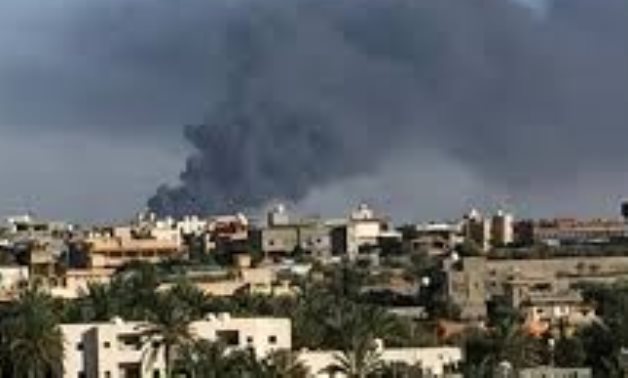
FILE PHOTO: Smoke rises during a fight between members of the Libyan internationally recognised government forces and Eastern forces in Ain Zara, Tripoli, Libya May 5, 2019. REUTERS/Ayman al-Sahili
CAIRO - 3 October 2021: Chairman of the Presidential Council of Libya Mohamed Younis al-Menfi discussed on Friday with German Federal President Frank-Walter Steinmeier in Bellevue Palace means of fostering bilateral ties.
Earlier, German Chancellor Angela Merkel argued for the withdrawal of foreign mercenaries from Libya at a meeting with Menfi.
"The question of the future of Libya must be determined by Libyan forces and Libyan citizens and not by foreign influence," Merkel said in Berlin.
The outgoing chancellor also touched upon preparations for Libyan elections, which are scheduled to take place on December 24.
Last year, the German government - which has taken on a role as mediator in the conflict - hosted a major summit in Berlin with the aim of ending the interference of other countries with arms deliveries and mercenaries into Libya.
Since the outbreak of the Libyan crisis nine years ago, Egypt has consistently advocated the need for a comprehensive approach to end the Libyan crisis by dealing with all of its political, economic and social dimensions and not being limited to the security dimension.
Egypt, with its great people and strong army, continues to work for peace and call for the settlement of all crises through political tracks that meet the aspirations of the people and respect the rules of international legitimacy. However, this does not mean surrendering and negotiating with the enemy forces, terrorist militias and mercenaries brought in to threaten regional and international peace and security.
In April, the United Nations Security Council gave the green light to deploy 60 observers to the ceasefire in Libya, urging the country's new national unity government to prepare for free and fair elections on December 24.
The Security Council approved a proposal of the Secretary-General of the United Nations, António Guterres, to deploy observers for a ceasefire in Libya.
Guterres addressed to the Security Council on April 7, "The observers will deploy to Sirte once all the requirements for the permanent presence of the United Nations are met, including security, logistical, medical and operational aspects." "In the meantime, there will be a presence in Tripoli as soon as circumstances permit," he added.
In the resolution adopted by the Security Council, the Council stressed the "complete and real participation of women and youth" in the elections.
The UN Security Council strongly urged all states to respect and support the ceasefire by withdrawing all foreign forces and mercenaries from Libya "without delay" and to demand full compliance with the arms embargo imposed on Libya.
Libya, a major North African oil and gas producer, has enjoyed little peace since the 2011 NATO-backed uprising against Muammar Gaddafi, and the sprawling country has been split since 2014 between rival factions.
Comments
Leave a Comment